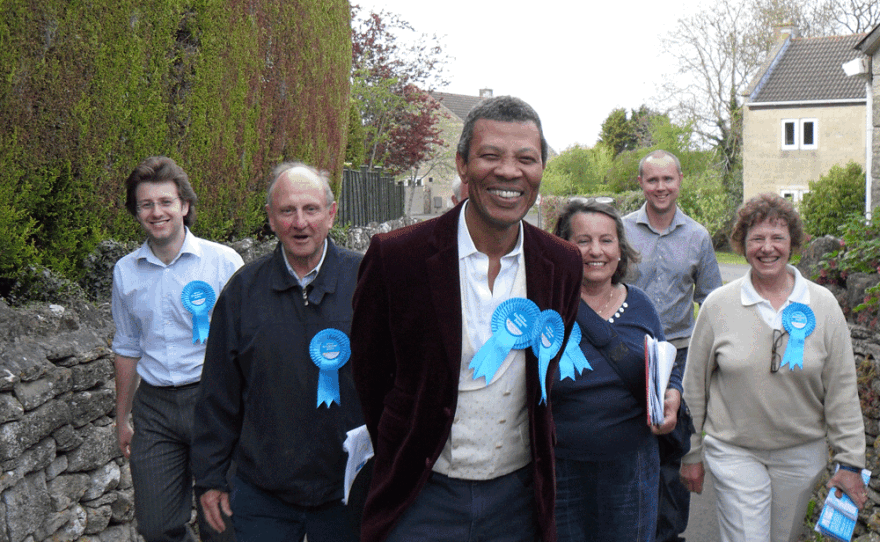When asked what his biggest concern is as he goes to vote in Britain's election Thursday, Michael Simons doesn't hesitate: "Immigration," he says, "jobs and the financial situation."
Simons, who has lived in the tiny village of Winsley in deepest rural Wiltshire for the past 30 years, is not alone in his concerns, which reflect the fears of large swathes of Britain's rural, mostly white population.
The man he is speaking to is the Conservative candidate for the constituency, Wilfred Emmanuel-Jones, who is nodding attentively.
"What we need," says Emmanuel-Jones, "is a cap on immigration for people coming from outside the European Union."
Surprisingly for a Conservative candidate in this part of Britain, Emmanuel-Jones is black. Born in Jamaica, he moved to Britain at age 4 and grew up in a poor inner-city household in Birmingham, the eldest of eight children. From there he worked his way up, after several years working for the BBC, to set up a successful farm business under the name The Black Farmer.
The residents of Winsley don't seem at all bothered by the color of his skin; they are more interested in his firmly Conservative stance on key issues such as immigration and Britain's massive deficit.
"After the election, the reality is going to set in that we've got a massive debt to sort out, which means that there are going to have to be cuts, that there's going to have to be a subconscious change in the way that we think," Emmanuel-Jones says. "The idea that you've got this big state who's there to look after us and care for us ain't going to happen, and people have to realize that."
Despite the enthusiasm in rural villages for this Conservative line, and the need to make cuts to Britain's welfare state, Emmanuel-Jones still has a fight on his hands. Race may not be an issue, but after a recent scandal in Parliament about how politicians claimed their expenses, there is anger at politics-as-usual, which generally means the two-party politics of the Conservatives and the ruling Labour Party.
This has worked in favor of the third party, the Liberal Democrats, which has also received a boost from the strong performances of its leader, Nick Clegg, in Britain's first televised debates in recent weeks.
At a school in the nearby town of Chippenham, Emmanuel-Jones takes on three other candidates, taking questions from a hall full of high school seniors, many of whom are first-time voters. One of his opponents is his closest rival in the campaign to represent Chippenham in Parliament: Duncan Hames of the Liberal Democrats.
Hames is an impressive, Oxford-educated accountant, whose responses to a wide range of questions are applauded by the audience. His answers reveal the moderate centrist approach of the Liberal Democrats, presenting themselves as the outsiders as they try to attract voters disenchanted with the left-of-center Labour Party and the right-of-center Conservatives.
"There are some big differences," Hames says. "But some of the differences in the political outlook of the candidates are smoothed over by the [central] PR operations of the political parties.
"Some of the things my Conservative opponent says about his ideological attitude to the public sector are things that you would never hear [Conservative Party leader] David Cameron say."
But Emmanuel-Jones is unrepentant, sticking to his staunch conservatism, repeating that he is the one being honest, and that voters just need to deal with the truth. On his way out of the debate, he is accosted by a young student, angry over what he sees as the Conservative Party's abandoning of the poor.
"I don’t need you to tell me about poverty," Emmanuel-Jones retorts.
The student interrupts, and after trying to answer the question several times, Emmanuel-Jones gives up, shakes a few more hands and heads for the exit.
After all the lamenting in the media that this election, dominated by TV debates and media sound bites, is being fought too much on personalities and not enough on policies, it's clear that at the grass roots, policies count as much as they ever did before.
Copyright 2022 NPR. To see more, visit https://www.npr.org. 9(MDAzMjM2NDYzMDEyMzc1Njk5NjAxNzY3OQ001))







